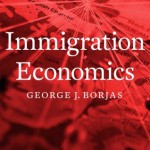 On June 11, in the Hayek Auditorium of Cato Institute and in front of an audience of 200 people, IZA fellow and 2011 IZA Prize laureate George J. Borjas presented his new book Immigration Economics, which was discussed by IZA Program Director Migration Amelie F. Constant. Alex Nowrasteh, Immigration Policy Analyst, Center for Global Liberty and Prosperity at Cato Institute moderated the discussion (view event video).
On June 11, in the Hayek Auditorium of Cato Institute and in front of an audience of 200 people, IZA fellow and 2011 IZA Prize laureate George J. Borjas presented his new book Immigration Economics, which was discussed by IZA Program Director Migration Amelie F. Constant. Alex Nowrasteh, Immigration Policy Analyst, Center for Global Liberty and Prosperity at Cato Institute moderated the discussion (view event video).
Starting with selection issues, George Borjas, a leading authority in the economics of migration, moved on to the economic assimilation of immigrants and then discussed the economics, the modeling and the empirics of the impact of immigrants on natives. He also talked about difficult to quantify issues such as positive externalities created from high skilled immigrants. Above all, immigration has distributional consequences and affects different groups differentially. George cautioned the audience to keep an open mind about how to interpret the existing evidence. While he explained why the same studies may find different results, he challenged us to think about proper measures to tackle the deficiencies of our current knowledge.
Amelie F. Constant praised the book as “thorough, well-argued, factual, insightful, vivid, and pleasant to read.” Amelie said that the book contains the state-of-the-art in the economic benefits and costs of migration as well as in the impact on natives literature. More importantly, the book provides the right stimuli to undertake further research and advance the filed. “Immigration Economics sharpens our understanding of immigration with its clarity, educates us about economic models with rigor, and makes us think for ourselves. This book will become a classic,” said the Program Director. The book forum ended with discussion and questions from the audience.

Immmigration Economics
George J. Borjas
Harvard University Press, June 2014
Hardcover, 296 pages
ISBN 9780674049772